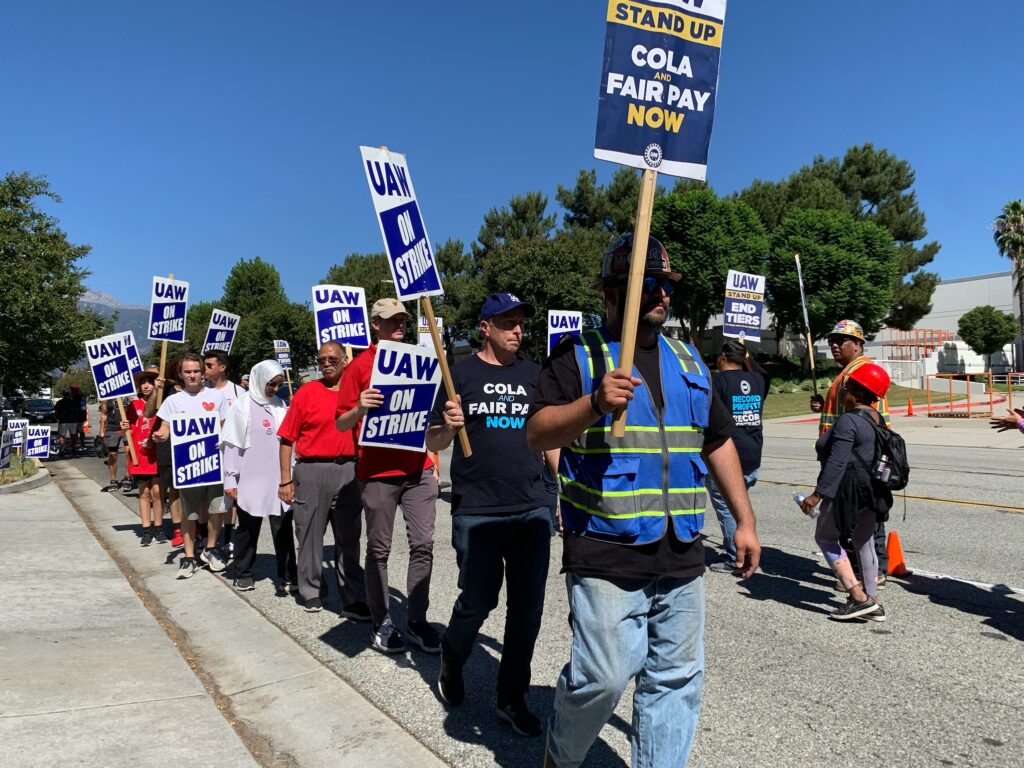As the UAW strike against the big three automakers entered week four, the labor upsurge shows no signs of slowing down. On Monday, October 9 the strike expanded to the Volvo-owned Mack Trucks after 73 percent of workers voted to reject a tentative agreement and brought out 4,000 workers on strike. On Wednesday, October 11, the UAW announced a strike at Ford’s biggest plant globally, bringing out 8,700 union members in Kentucky. At the end of week the UAW organized rallies in several key sites across the country including in Chicago and outside of Los Angeles in Rancho Cucamonga.
The rallies were bolstered by news from Shawn Fain that General Motors (GM) had agreed to bring battery production for electric vehicles under the UAW’s national master agreement with the company. Fain announced this shift as a victory and a sign that the strike is bringing results at the bargaining table since GM had previously refused to move EV production under the UAW contract. Given this concession the union did not strike at GM’s assembly plant in Arlington, Texas. Thus far, the strike has expanded to six assembly plants of the Big Three and 38 parts depots operated by GM and Stellantis.
[embedyt] https://www.youtube.com/watch?v=ILS-4HkA0i0[/embedyt]
Video by Promise Li.
No Deals! No Wheels! No Automobiles!
As the Stand-Up Strike has spread, the union has held rallies to update members on negotiations and to bring out supporters to the picket lines. On Friday, October 6, a solidarity rally was also held at the picket line of GM’s Rancho Cucamonga Parts Distribution Center to support UAW Local 6645.
The rally brought out more than 150 people from Los Angeles and surrounding cities to support the picket line in Rancho Cucamonga in 95 degree heat. Among those attending there were several supporters coming from the LA Labor Council, the Sierra Club, the Association of Flight Attendants (AFA), the National Day Laborer Organizing Network and the Service Employees International Union, which has been active in the strike at Kaiser Permanente.
Members of the Alaska Airlines AFA spoke in solidarity with the UAW strike and talked about their ongoing negotiations with Alaska Airlines. In the past, the AFA has used a labor strategy known as CHAOS – Create Havoc Around Our System, which is similar to the Stand-Up-Strike used by the UAW. They threaten to use CHAOS if Alaska Airlines does not negotiate in good faith. The Sierra Club also spoke in support of Shawn Fain’s announcement of the EV transition although some UAW workers were not big fans of electric vehicles.
After the rally, UAW members and supporters joined a lively picket line led by the music collective Los Jornaleros del Norte, played labor songs, cumbias and norteña classics to hype up the crowd. With chants of “No deals?! No wheels! No automobiles!” and “Hey! Hey! Ho! Ho! Corporate greed has got to go!” the picket gathered support from drivers and truckers passing by the industrial park. Los Jornaleros del Norte are a local music collective in the tradition of Latin American protest music. Their lyrics support labor struggles, migration, and social justice causes. They also played the song “Amor Eterno” to honor the working class victims of the COVID-19 pandemic.

Throughout the afternoon the crowd was fed by taqueros brought by the Los Angeles chapter of the Democratic Socialists of America chapter as part of their ongoing labor solidarity campaign “Tacos for Strikers,“ which they have also brought to writers’ and actors’ picket lines. Members of LeftVoice and the Tempest Collective also attended the rally in solidarity with the UAW and will continue to support the strike across the country.
Labor insurgency continues
Meanwhile, the labor insurgency continues across several industries including a historic healthcare strike at Kaiser Permanente where the SEUI-United Healthcare Workers brought out 45,000 workers for a three-day strike; they have threatened to go out again if they don’t see progress at the bargaining table. The Screen Actors Guild (SAG-AFTRA) has also entered its third month on strike, as its 65,000 members remain without a contract.
These strikes have the potential to show workers that they can fight for—and win—better wages, contracts, and benefits if they’re well organized and stand strong. We are already seeing the impact that the UAW strike has had on the confidence of Mack truck workers, also UAW members, who rejected the crumbs of the tentative agreement with 73 percent of the vote and caught the bosses by surprise. This shows that they are confident they can get a better contract from Volvo Group.
Millions of workers are paying attention to these waves of strikes. The Left and all allies of labor must continue to mobilize to make sure that all these strikes win so they continue to raise the sights of labor in sectors that aren’t unionized or that haven’t gone out on strike yet.

